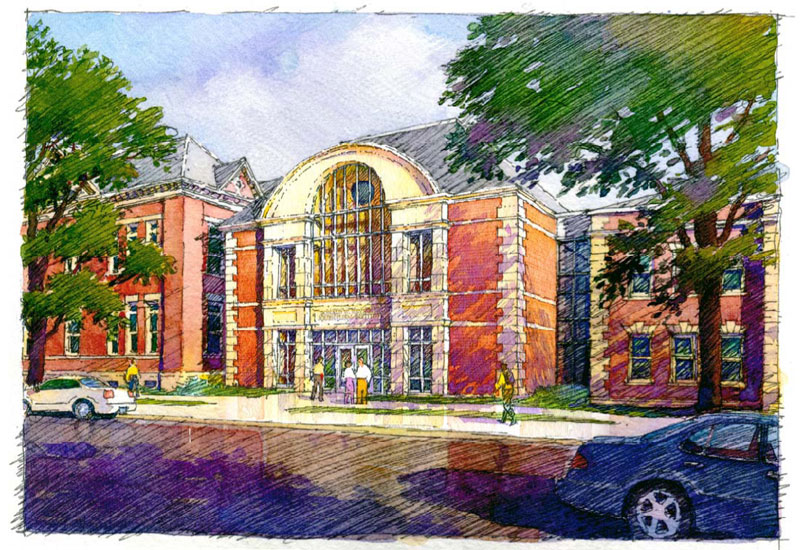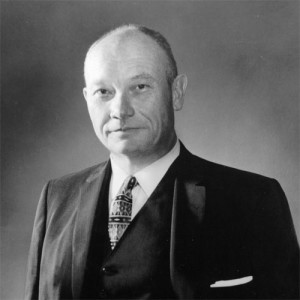Donald W. Reynolds Foundation Grant Largest Ever for University of Missouri

$31 Million Grant to Establish Journalism Institute
Columbia, Mo. (Feb. 9, 2004) — The Donald W. Reynolds Foundation announced today the awarding of $31 million to the Missouri School of Journalism for the creation of the Donald W. Reynolds Journalism Institute, a center that will focus on advanced studies of journalism and its role in democratic societies.
The award is the largest private donation ever to the University of Missouri.
Plans for the Reynolds Institute were announced today by Fred W. Smith, chairman of the Foundation. Richard Wallace, chancellor of the University of Missouri-Columbia, accepted the gift on behalf of the University.
The award will include up to $16,731,129 to build a new building and renovate two existing buildings on the MU campus to house the institute. An additional $1,834,702 will fund technology and furnishings for the high-tech facilities.
In addition, up to $12,434,169 will be made available over a six-year period to fund the Institute’s staff salaries, programs and operations.
Donald W. Reynolds, who passed away in 1993, was a 1927 graduate of the School of Journalism. Reynolds turned an initial $1,000 investment – part of it borrowed – into the Donrey Media Group, one of the largest privately held communications companies in the United States. Fred W. Smith was the president and chief executive officer of that organization.
In announcing the award, Smith said the new Reynolds Institute would provide an exceptional environment of learning for both students and practicing journalists.

“The Foundation trustees and I feel that the University of Missouri School of Journalism is uniquely positioned in its ability and capability to create a world-class center for journalism studies. Missouri’s reputation for high quality, hands-on education and research were instrumental in the trustees’ decision to fund the institute here. We trust that the Donald W. Reynolds Journalism Institute will become a fixture in journalism education that will have a positive impact on individuals and the industry for generations,” said Smith.
The School of Journalism, the first in the world, will celebrate its centennial in 2008. It operates its own community daily newspaper, the Columbia Missourian, and its own network affiliate television station, KOMU-TV. Journalism students also get hands-on experience at the University’s KBIA radio, Global Journalist magazine, and several School-related online media.
Through its Center for Advanced Social Research, the School conducts research on media-related issues for media, government and non-profit organizations. The School is also the national headquarters for a number of national journalism organizations, including Investigative Reporters and Editors, National Newspaper Association, The Journalism and Women Symposium, and The Society of American Business Editors and Writers.
Chancellor Wallace thanked the Foundation “for the vision to make this extraordinary investment in the campus.”
“This is truly a transformational gift,” he said. “Our internationally known School of Journalism will have the resources to partner with citizens and other organizations to strengthen journalism. We attract the finest journalism students, scholars and practitioners from all over the world; now they will be even better served. We are pleased that the trustees saw Mr. Reynolds’s alma mater as the appropriate location for the institute and we will do everything within our ability to see that the Donald W. Reynolds Journalism Institute will honor his contributions to the field of journalism and communications.”
Dean Mills, dean of the School of Journalism, said the Reynolds Foundation gift will enable the School to build on its existing teaching and research strengths “to help journalists better serve democracy-and to help citizens better understand how journalism works.”

“And we at Missouri will work very hard,” he said, “to ensure that the Reynolds Institute quickly takes its place as the leading center in the world for developing, testing and disseminating new and better approaches to journalism.”
“We envision an institute that will bring together some of the world’s best practitioners and scholars of journalism and give them the time and the technology-rich environment to develop and test new and better forms of journalism. And we see citizens–who have the largest stake in quality journalism–as continuing collaborators in that process,” said Mills.
He said the Institute will focus its activities on three areas:
- The Reynolds Fellows program, in which four visiting and two MU faculty will work on projects aimed at improving the practice and understanding of journalism.
- Experiments using new technologies for journalism and advertising, developed in the Institute’s Journalism Futures Laboratory and its Technology Demonstration Center.
- Forums, workshops, lectures and other programs in which journalists, citizens and academics work together to strengthen the quality of journalism in democratic societies.
To house the Institute, the University will erect a new building and renovate two others on the northeast corner of historic Francis Quadrangle. Shaughnessy Fickle and Scott Architects of Kansas City drew preliminary plans for the project in preparation for the proposal to the Reynolds Foundation.
A Victorian gothic structure built in 1892 to house the School of Law, currently vacant, will be renovated to house Institute offices and the Journalism Library. A modern four-story structure will be constructed inside the historic brick and limestone exterior.
A new building, with a brick and limestone exterior designed to match the historic buildings on the Quad, will be erected between the 1892 building and Walter Williams Hall, part of the journalism complex at the north end of the Quad.
The new building and renovated space in Walter Williams will house a public reception and exhibition area, a 120-seat forum equipped as a broadcast-quality television studio, the Journalism Futures Laboratory, the Technology Demonstration Center, multimedia editing stations, seminar rooms and offices for visiting professionals and scholars.
Mills said the new facilities could be completed by spring or summer 2007.
It is the second major MU building project financed by the Reynolds Foundation. The Donald W. Reynolds Alumni Center, dedicated in 1992, was built with a $9 million gift from the Foundation-at the time, the largest gift in the history of the University.
The Donald W. Reynolds Foundation is a national philanthropic organization founded in 1954 by Mr. Reynolds. Headquartered in Las Vegas, Nevada, it is one of the 50 largest private foundations in the United States.
Updated: April 28, 2020